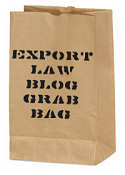
ABOVE: Howard Berman
Chair, House Foreign Affairs
Yesterday, the House Committee on Foreign Affairs approved legislation that would, among other things, amend parts of the Arms Export Control Act (“AECA”). The Bill, H.R. 2410, is titled the ‘‘Foreign Relations Authorization Act, Fiscal Years 2010 and 2011’’ and was sponsored by Rep. Howard Berman, chair of the committee.
Like many of its predecessors, the bill would set processing time goals for licenses and commodity jurisdiction requests, each to be no more than 60 days. And commodity jurisdiction determinations would be required to be posted by the Directorate of Defense Trade Controls (“DDTC”) on its website. The processing times are just “goals” so, even if the legislation passes, I wont be holding my breath waiting for CJ requests to blast out the door in 60 days. But I think we can all give some polite golf claps, and maybe even a louder hooray or two, to the requirement that CJs be posted on the website.
Section 826 of the bill permits the President to remove “satellites and related components” from the United States Munitions List, but it is poorly drafted and has a confusing China exception which reads:
(b) Exception- The authority of subsection (a) may not be exercised with respect to any satellite or related component that may, directly or indirectly, be transferred to, or launched into outer space by, the People’s Republic of China.
Come again? Does this mean that satellites and parts that might be transferred to China stay on the USML and, like all other items, require a license to all destinations? Or does it mean that DDTC can decide that the satellite-related items in Category XV can be exported to every destination but China without a license? And where does the Bureau of Industry and Security (“BIS”) fit into this? Can it require BIS licenses for satellites and parts removed from the USML? Your guess is as good as mine.
A third provision of interest in the proposed legislation might be referred to as the Full Prisons Act. Section 831 increases the maximum criminal penalty from 10 years imprisonment to 20 years imprisonment. For whatever reason, Congress seems unable to enact any reform with increasing prison sentences, even though this appears to be an effort to conform the criminal penalties under the AECA to the increased penalties provide under the International Emergency Economic Powers Enhancement Act (“IEEPEA”) for violations of other export laws. Look for life imprisonment to be a penalty for false AES entries in the not-so-distant future.
Section 831 also attempts to conform civil penalties under the AECA to those enacted under IEEPEA by providing for a penalty equal to the greater of $250,000 per violation or twice the value of the export involved. But Representative Berman’s legislation doesn’t quite manage to get this right either. First, it fails to amend section 38(e), 22 U.S.C. § 2778(e) of the Arms Export Control Act which sets the maximum civil penalty at $500,000. Does this mean that a transaction valued at $1 million, and thus eligible for a $2 million penalty under the amended 38(c), is limited to a penalty of $500,000?
Worse the language of the bill, unlike the language in IEEPEA, makes the penalty payable “upon conviction.” Does that mean that the civil penalty is only available after a criminal conviction? Again, this is probably a drafting oversight, but with all the newly unemployed lawyers in town, can’t the committee hire somebody to clean up its bills?

 Posted by
Posted by  Category:
Category: 

 The lede in the Globe and Mail
The lede in the Globe and Mail 
 Nonagenarian New York prosecutor, Robert Morgenthau, still keeps trying to grab the spotlight after all these years, even if it means wasting immense amounts of New York state funds on a criminal prosecution he can’t win and which should have been brought, if at all, by federal prosecutors. I’m talking about his
Nonagenarian New York prosecutor, Robert Morgenthau, still keeps trying to grab the spotlight after all these years, even if it means wasting immense amounts of New York state funds on a criminal prosecution he can’t win and which should have been brought, if at all, by federal prosecutors. I’m talking about his  No big news today, so it’s time for another Export Law Blog grab bag:
No big news today, so it’s time for another Export Law Blog grab bag:

